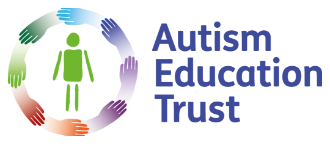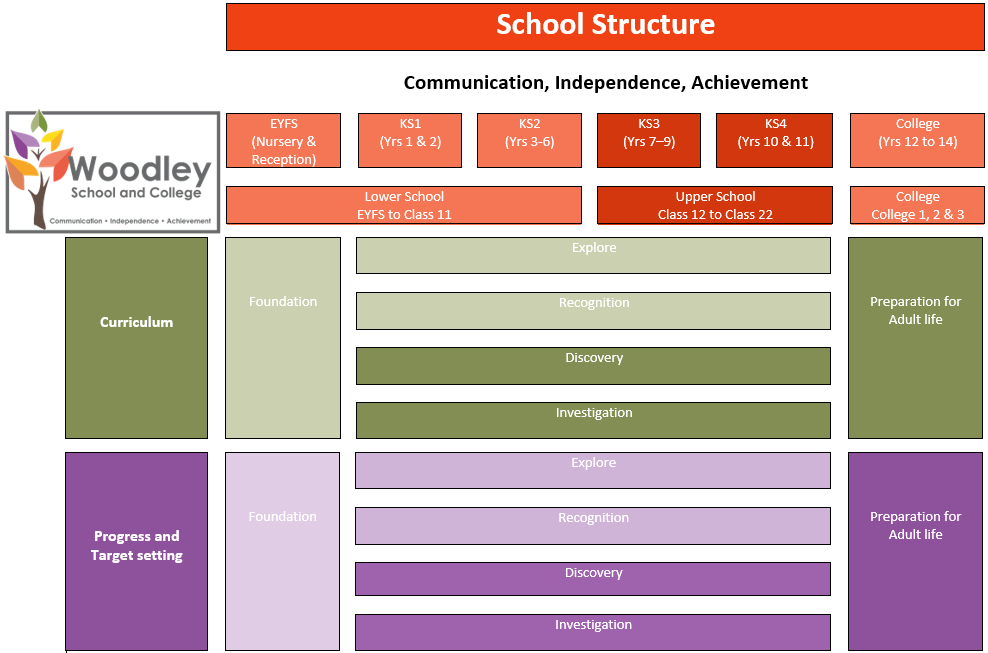SEN Information
SEND INFORMATION REPORT 2022
The kinds of SEND that are provided for
Woodley School and College is designed for children and young people who are not able to access a supported place in a mainstream school or other special school provisions.
Pupils will have an EHCP (Education Health and Care Plan) with their main need identified as being consistent with a diagnosis of Autism. It is likely that pupils may also have additional needs associated with the diagnosis, e.g. social and emotional needs, behaviours that challenge and high levels of anxiety.
Policies for identifying pupils with SEND and assessing their needs
Special_Educational_Needs_Policy & Assessment-Recording-Reporting-Policy
Arrangements for consulting parents of children with SEND and involving them in their children’s education
We aim to have a close working relationship with parents and carers. E portfolios inform parents about progress made on a daily basis. Teachers and support staff and where appropriate pupils complete the E portfolios. Individual Learning Plans are implemented termly and shared with parents. There are formal parents evenings twice a year but parents/carers are very welcome to request a discussion with teachers at any time through the year. Contact via telephone, email or face to face is encouraged. Parents are asked to contribute to the EHCP review process
Arrangements for consulting young people with SEND and involving them in their education
Pupils are involved as much as possible in the development of their own individual learning plan and pen portraits. They contribute their own views to the annual review process in a way that is meaningful and appropriate to them. On a regular basis they are encouraged to play an active role in their own learning.
There is a school council which meets regularly and influences what is happening across the school. An example of this was their involvement in the design of the playground.
Arrangements for assessing and reviewing pupils’ progress towards outcomes
Children are continually assessed both formally and informally in order for teachers to plan the next steps of learning. We target set and measure all of our students’ progress using a variety of specifically designed assessment tools. We use B Squared, Autism Progress and SCERTS to identify progress across a range of areas.
Each pupil has an ILP (individual Learning Plan) which is reviewed termly and links to the outcomes in their EHC plan and SCERTS targets. All pupils are provided with opportunities to take part in this process.
There are formal parents evenings twice a year but parents/carers are very welcome to request a discussion with teachers at any time through the year. The Annual Review process also gives an opportunity to hear about the progress their child is making.
Arrangements for supporting pupils moving between phases of education and preparing for adulthood
There is a clear transition programme in place where it is necessary this can be individualised. We will visit the child or young person in their current school and talk to staff about progress and interests. The child and parents/carers will visit Woodley, followed by several visits with support staff from the current school gradually building up the time spent in their new class in Woodley. They will start either on full days or if deemed necessary on a partial timetable until they are settled into the school.
Where pupils are moving to a different setting There will be a similar process to starting Woodley School. They will, where possible visit their new setting and become familiar with it. Their progress and how they learn best will be shared with the new setting
Year 11 and Year 14 are effectively prepared for the next phase in their education through the curriculum that is in place. C & K careers come into school on a weekly basis and follow a programme focussing on readiness for the next step. The EHCP reviews support the transition process The young person and parents/ carers are a key part of the process. In moving into post 16 and post 19 support will be given to ensure the young person and their parents/carers are able to make an informed decision on the most appropriate setting.
In preparing for adulthood this is a process that is embedded across the school with a clear emphasis on: independence; social interaction; communication and skills for life. Our pupils are supported to become motivated, hardworking and confident individuals. All children begin at the school with a variety of experiences, opportunities and needs. It is our role to build upon that learning and experience. A holistic approach to learning aims to ensure parents/carers, teachers / support staff and multi-agency services work effectively to support a variety of learning opportunities.
We have been awarded the Quality in Careers Standard.
We encourage the pupils to develop a sense of pride, care and sensitivity towards themselves, each other and the school.
The approach to teaching pupils with SEND
There is a Person-centred approach each child or young person is at the heart of decision making about the approach taken to support their learning and to meet their diverse needs
A partnership between home and school is encouraged, with an important focus on a child or young person being able to learn and generalise their learning across home, school and in the community
Our approach is informed by the knowledge and expertise of staff and additional professionals, underpinned by an emphasis on positive behaviour support, self regulation and a Total Communication approach, where we make use of a number of modes of communication such as sign, oral, auditory, written and visual aids including hi-tech communication aids, depending on the particular needs and abilities of the child.
How adaptations are made to the curriculum and the learning environment of pupils with SEND
We offer an inclusive curriculum which ensures equality of opportunity, enabling access to all aspects of the curriculum irrespective of gender, race, disadvantage or disability.
At Woodley we encourage and develop a love of learning for all our pupils that will stay with them throughout their lives. Our aim is that they are healthy and safe and they enjoy and achieve in all areas of their learning. At Woodley our children are encouraged to enjoy and achieve as individuals, as part of a group and as part of a school. Each young person is an individual and is a valued member of our school. Our specialised curriculum, taught by experienced teachers and support staff enables all of our children to achieve at their own pace and step. We believe in having a positive approach towards school life
We follow the National Curriculum and have used it as a base to develop the Woodley Curriculum which ensures that all pupils follow a curriculum appropriate to their needs.
There are 4 curriculum pathways: Explore, Realisation, Discovery, Investigation. Subjects are linked to areas of learning. This can be seen clearly in the Woodley Curriculum Structure.
Additional support for learning that is available for pupils with SEND
Where appropriate additional support in the form of resources, interventions and strategies will be implemented.
The expertise and training of staff to support pupils with SEND
Staff working at Woodley School have wide and varied backgrounds and qualifications including: Teachers qualified in working with pupils who have autism, Makaton trained staff, staff trained in PECS, Intensive Interaction, SCERTS and Team Teach. We work collaboratively to develop provision and share good practice with other schools. Woodley is the Autism Educational Trust (AET) school’s hub and post 16 hub for Kirklees.
How equipment and facilities to support children and young people with SEND will be secured
Equipment and additional resources will be provided to support the learning where required. A variety of funding streams can be identified depending on the equipment needed to support this.
How the effectiveness of the provision made for pupils with SEND is evaluated
At Woodley we recognise the need to monitor and evaluate all aspects of our work. In this way we aim to constantly improve the quality of our provision within the context of our mission statement, aims and ethos. All monitoring must be based on a sound and open understanding of the needs of our pupils
Evaluation at Woodley includes the following:
- Annual Reviews for pupils;
- Risk Assessments
- Regular evaluation of teaching and learning, the environment, work scrutiny
- Evaluation and review of the School Improvement Plan, and action plan including questionnaires to seek input from staff and from families
- Staff Appraisals
- External Monitoring visits such as Learning Partner, Ofsted, National Autistic Society Accreditation. The school was awarded NAS (National Autistic Society) Advanced Accreditation Award in May 2021
Support for improving emotional and social development
Staff are positive, proactive and caring, demonstrating an understanding and detailed knowledge of the pupils in their care. The learning environments are focused in terms of structure and approach which in turn makes each pupil feel safe, secure and valued. All pupils have SCERTS (Social Communication Emotional Regulation and Transactional Supports) targets. The achievements of pupils, however small, are rewarded and appropriately praised. All pupils are treated equally and with dignity and respect. Staff provide pupils with opportunities to develop appropriate social skills through which an understanding of social relationships may be developed.
Pupils are provided with opportunities to make a positive contribution to their family, class, school and community and provided with opportunities to experience the world of work (e.g. jobs in class / school, work experience) and feel valued.
There is an ethos of positive behaviour support across the school
How the school involves other bodies
We access whatever services are needed to support the child and their family. We have close working relationships which leads to regular input from Speech and Language Therapy, Educational psychologist, medical professionals and social care. We have Occupational Therapy, Art and Music therapy within school.
Arrangements for handling complaints from parents of children with SEND about the provision made at the school
Parents are welcome to raise any concerns they may have as soon as they arise that way we can work our way through them together.
Where they feel this has not been addressed there is a complaints policy which outlines clear procedures which will be followed
Contact details of support services for parents of pupils with SEND
A range of support services are available. The pupil and family support lead Judith Beaumont can signpost parents and support them in accessing services.
The schools contribution to the local offer and the LA’s local offer is published
This is available on the school website under Local Offer


